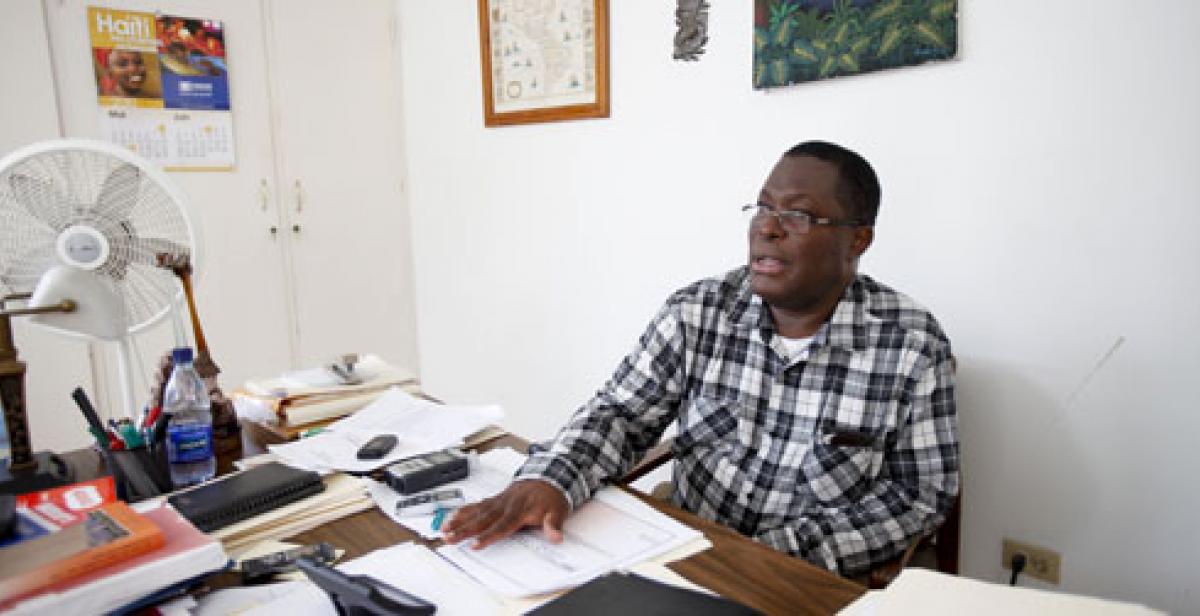On 10 January 2010 when the devastating earthquake hit Haiti, Fr Kawas Francois led one of the first emergency response units to be on the scene, helping to rescue people and relocate them to safer places along with fellow Jesuit priests. The Jesuit house also became a distribution centre for water and food as well as medical teams meeting the basic needs of those caught up in the destruction that the earthquake caused.
In the three years since then, Fr Kawas has become the head of aid monitoring organisation CERFAS. In the immediate aftermath of the earthquake billions of dollars were pledged from the international community to help Haiti recover, but there has been sustained criticism of the way this money was handled and of the government’s failure to provide a practical strategy.
Mass destruction
“The earthquake changed the history of Haiti,” Fr Kawas says. “There was mass destruction from public offices, to schools, to hospitals and people’s homes and businesses – everything was destroyed.” This left 1.5 million people living in temporary accommodation – mainly tents along unsuitable areas of land.
“At first, after the earthquake, aid flooded in from across the world and Haitians were hopeful of receiving support to not only help survive the aftermath of a huge natural disaster but come out of it stronger.
“NGOs did do a lot of good but there were challenges too,” Fr Kawas recalls.
Not enough progress
“The international wave of compassion and solidarity towards Haiti was really encouraging immediately after the earthquake had happened but the long term story is very different,” Fr Kawas continues.
“Most of the reconstruction is yet to come – I’d like to tell you otherwise but that wouldn’t be true. There has been some progress but not enough.”
People are disillusioned
“One of the main challenges obstructing effective aid distribution,” according to Fr Kawas, “was the lack of any coherent system or structure from the Haitian government, or between the various NGOs.”
Not only does this mean that 300,000 people are still without adequate housing, it has impacted on people’s morale and resilience.
“Many people are disillusioned after having high expectations with the initial response to the earthquake. There has also been corruption with aid money and Haitian people have not been given the chance to influence decisions that affect them.”
So what keeps people going?
When asked what has kept people going, Fr Kawas smiles and says that: “Faith has played a key role in helping many people remain resilient even after losing everything they had – including people they loved.
“It was a very hard time for the people of Haiti and things have not got easier for everyone. Some people blame God but I reassure them that God is still with them, caring for them in their time of need.”
Signs of hope for women’s rights
Amongst the tent cities and remaining rubble there are strong signs of hope emerging in Haiti, which Fr Kawas is also keen to share.
“The women’s movement in Haiti is very strong now and there are many women’s organisations trying to improve the recognition of women’s rights at all levels,” Fr Kawas explains proudly.
“This has been a gradual process,” he says, “but also one which was not set back by the earthquake. There are now women in government and other positions of authority – although admittedly there are not many.”
Stronger civil society
Similarly, there are more Haitian organisations promoting human rights and trying to monitor and scrutinise public policy. Fr Kawas sees this increased activity in civil society as a very positive thing but recognises they still have some way to go before they can be really effective.
“Civil society organisations (CSO) are not very well organised,” Fr Kawas says. “Most know what they want to achieve but not how to get there.
Pressure to act
“There needs to be more co-ordination and planning between the NGOs to help support one other in common goals. I try to explain to people I know involved with CSOs – you have to help the government to help you, you can’t expect the government to meet your requests if they don’t even know what they are and if there is no pressure to act.
“Here in the UK all different groups of people are very active, from students to workers or environmentalists, and it’s a really good thing.”
Fr Kawas is optimistic about the progress Haiti will make but also acutely aware of the obstacles that will need to be overcome along the way. Above all, he hopes that Haitian people will be able to influence the decisions which affect them, building a democracy that is as resilient as the people of Haiti.
Interview by Progressio’s Lucy Jenkinson. Fr Kawas visited the UK in January 2013 at the invitation of Progressio.
Photo: Fr Kawas Francois pictured in his office in Port-au-Prince, Haiti, June 2010 (photo © Natasha Fillion/Progressio)



